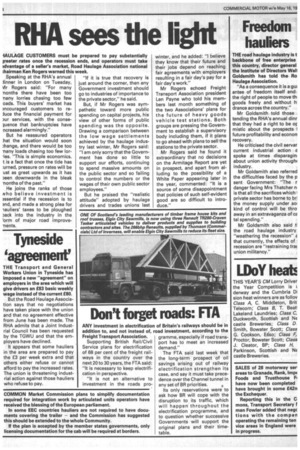RHA sees the li
Page 6

If you've noticed an error in this article please click here to report it so we can fix it.
iAULAGE CUSTOMERS must be prepared to pay substantially !meter rates once the recession ends, and operators must take idvantage of a seller's market, Road Haulage Association national :hairman Ken Rogers warned this week.
Speaking at the RHA's annual linner in London on Tuesday, Or Rogers said: "For many Tionths there have been too nany lorries chasing too few oads. This buyers' market has mcouraged customers to reluce the financial payment for )ur services, with the conseluence that bankruptcies have ncreased alarmingly."
But he reassured operators bat the situation would soon ;hange, and there would be too -nany loads chasing too few lor-ies. "This is simple economics, t is a fact that once the tide has .urned, pressure on rates will be ust as great upwards as it has )een downwards in the bleak -nonths of the past."
He joins the ranks of those rvho believe investment is assential if the recession is to and, and made a strong plea for lauliers' taxes to be ploughed )ack into the industry in the 'orm of major road improvements. "If it is true that recovery is just around the corner, then any Government investment should go to industries of importance to the private sector," he said.
But, if Mr Rogers was sympathetic toward more public spending on capital projects, his view of other forms of public spending was the opposite. Drawing a comparison between the low wage settlements achieved by the haulage industry last winter, Mr Rogers said: "I am only sorry that the Government has done so little to support our efforts, continuing to spend massive amounts on the public sector and so failing to control the numbers or the wages of their own public sector employees."
But he praised the "realistic attitude" adopted by haulage drivers and trades unions last winter, and he added: "I believe they know that their future and their jobs depend on reaching fair agreements with employers resulting in a fair day's pay for a fair day's work."
Mr Rogers echoed Freight Transport Association president Len Payne who told his members last month something of the two Associations' plans for the future of heavy goods vehicle test stations. Both groups are pressing the Government to establish a supervisory body including them, if it plans to go ahead with plans to sell the stations to the private sector.
Mr Rogers said he found it extraordinary that no decisions on the Armitage Report are yet in prospect, and apart from alluding to the possibility of a White Paper appearing later in the year, commented: "It is a source of some disappointment that policies of such self-evident good are so difficult to introduce."




































































































































